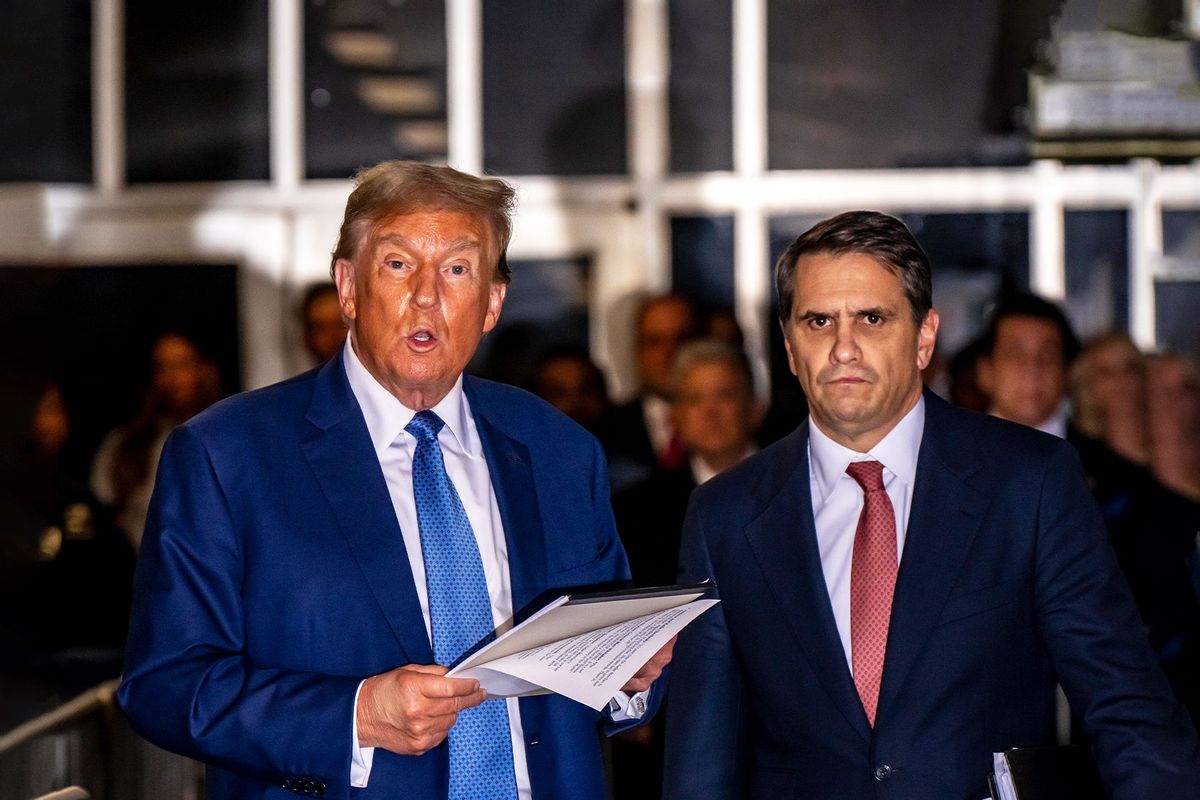Whether Donald Trump is guilty in the eyes of the law will be placed in the hands of twelve New Yorkers, who are set to begin deliberating in the former president’s hush money trial on Wednesday and could come back with a verdict this week. It will be they who decide if the presumptive Republican nominee becomes the first American head of state to be convicted of a crime after leaving office – and up to the judge, Juan Merchan, to decide whether a conviction means Trump will also be the first former president behind bars.
In his closing argument, defense attorney Todd Blanche tried to sneak that fact in during what was otherwise two hours spent attacking Michael Cohen, the former president’s ex-fixer, dubbed by Blanche as the “greatest liar of all time.” He also insisted that his client only ever paid Cohen for his legal work, subject to a retainer that was never documented. Saying that his client could go to prison if found guilty was how Blanche chose to close out, which does not suggest confidence that he will be found innocent; it’s also why one of the last things the jury saw was Merchan reprimanding the defense counsel, reminding him that the rules of court prohibit trying to sway jurors with talk of incarceration when the crime, here, could be punished with a fine.
Blanche, a former prosecutor himself, possibly calculated that the talking down would be worth if it give just one juror pause about the gravity of a conviction. It also reeked of “desperation,” per former federal prosecutor Harry Litman.
“The idea is to try to gin up a hung jury or some kind of person to have sympathy,” Litman said during an appearance on MSNBC. That, he argued, does not suggest confidence that the five weeks of trial – in which jurors saw Trump Organization financial documents spelling out how Cohen would be reimbursed for a $130,000 hush payment to Stormy Daniels, including handwritten notes from Trump loyalist and Rikers Island inmate Allen Weisselberg – went well for his client. “If you thought you had a decent shot at a hung jury without that, I don’t think you would engender the judge’s ire in that way.”
Timothy Parlatore, an attorney who previously represented Trump, was similarly underwhelmed by Blanche’s performance. “It went way too long,” he told CNN, saying the two-hour rebuttal of the prosecution’s case “probably bored the jury.”
It was dull without Blanche even addressing the documentary evidence, from Weisselberg’s handwritten notes, as the Trump Organization’s then-chief financial officer, on the apparent hush money conspiracy, to Trump Organization accountant Jeffrey McConney’s notes explaining how Cohen’s monthly payments “from DJT” would cover the taxes he’d owe from falsely claiming the hush money reimbursement as income.
We need your help to stay independent
“Why would Cohen and Weisselberg have done this without Trump’s authorization? The defense failed to come up with a compelling explanation,” wrote former U.S. attorney Joyce Vance on her personal website. Vance noted that multiple witnesses had described Trump as a micromanager – contra Blanche’s argument he’d be too busy as president to involve himself in an illicit scheme to falsify business records and evade campaign finance laws – and rebutted the notion that Cohen would drop $130,000 of his own money to buy Daniels’ silence without Trump’s knowledge and consent.
“This was the prosecution’s linchpin evidence,” Vance wrote, “and the defense didn’t offer the jury a good reason to reject it.”
Norm Eisen, a CNN legal analyst and senior fellow at the Brookings Institution, was similarly underwhelmed.
“The prosecution was ahead on points going into the closing arguments and Tuesday did not change that calculus,” he wrote in a commentary on the closing arguments.
Ty Cobb, another former Trump attorney, was more blunt.
“The chance of an acquittal is zero to none,” he told The Daily Beast.
Read more
about Trump's Manhattan trial



Shares